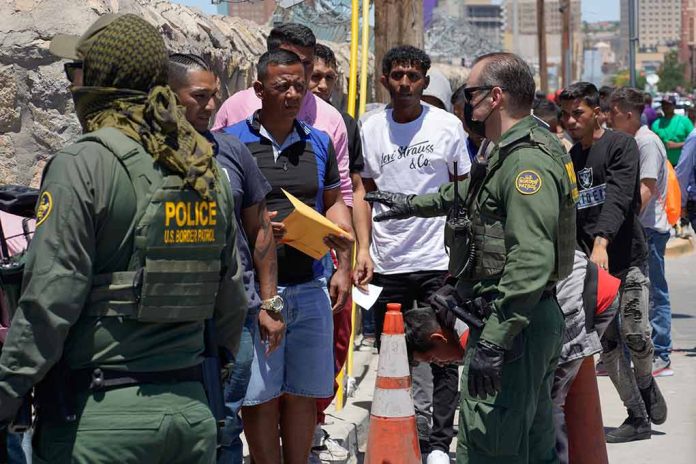
As illegal crossings surge at the Texas border, residents arm themselves to protect against escalating security threats.
At a Glance
- Texans arm themselves amid a surge in illegal border crossings, feeling personal firearms are necessary for safety.
- A bipartisan deal aims to address the migrant influx and provide aid to Ukraine, Israel, and Taiwan.
- The deal splits Texas lawmakers, with opinions not falling strictly along party lines.
- Local law enforcement navigates a complex landscape involving public safety concerns and political immigration debates.
Residents Turn to Firearms for Protection
In the wake of increased illegal crossings along the Texas border, residents of Eagle Pass and other border towns are resorting to personal firearms for self-defense. With security concerns mounting, locals feel the need to take matters into their own hands. This development comes amid a broader narrative of frustration towards national immigration policies and enforcement measures.
Nestled against the U.S.-Mexico border, Eagle Pass has seen a dramatic spike in border activity. According to local reports, these circumstances have left many residents worried and desperate for increased safety measures, prompting them to arm themselves.
According to a senior official, “Until President Biden reverses his open border policies and does his job to secure the border, Texas will continue protecting Texans and Americans from the chaos along the border.” This sentiment echoes throughout the community as they grapple with the realities of living on the front lines of the immigration crisis.
Bipartisan Immigration Deal Stirs Controversy
Amidst these local tensions, a bipartisan deal aims to curb migrant influx while offering support to Ukraine, Israel, and Taiwan. The deal has sparked controversy, with figures like U.S. Rep. Colin Allred endorsing the $118 billion agreement, viewing it as a step towards comprehensive reform. However, other political leaders like Sen. Ted Cruz and Democratic state Sen. Roland Gutierrez openly oppose the proposal, citing inadequacies in its provisions.
“It would codify Biden’s open borders into perpetuity. Terrible for Texas, but DC Dems love it,” Sen. Cruz expressed on social media, underscoring the deep divide among Texas lawmakers over this issue.
“Ted Cruz is choosing cynical partisan politics over doing what’s best for Texas,” Allred said in a statement. “This agreement does not have everything I had hoped for, but it is an important step and I will continue working towards comprehensive reform that includes protections for our Dreamers. Our border communities cannot afford six more years of Ted Cruz.”
The legislation includes asylum screening, expanded detention, and border shutdown provisions. Despite being negotiation over months by bipartisan figures, it meets praise and criticism from various stakeholders. The White House and National Border Patrol Council have thrown their support behind the package, further emphasizing the polarized nature of the debate.
A few thoughts on this video:
1. If the migrants are this close to the National Guard, it means they already crossed the border. The wire and the barriers are on the U.S. side. Texas nor the US is allowed to erect barriers on the Mexican side. https://t.co/yUudHpXFVd
— Uriel J. García (@ujohnnyg) March 21, 2024
Local Tensions and Government Standoffs
Complicating matters in Eagle Pass are the moral and practical concerns raised by residents. Operation Lone Star, launched to use Texas National Guard and state troopers to secure the border, has introduced concertina wire and other barricades. While intended to strengthen border security, these measures have also caused property damage and business disruptions, leading to deeper tensions.
“They’ve turned Eagle Pass into a war zone,” said Jessie Fuentes, the owner of a local kayak company that has sued Texas’ government over the use of buoys. “I feel like I’m in a turf war between the federal and state government, and in the middle is our community.”
Mistreatment and drownings of migrants as well as the continued illegal crossings despite these efforts have left many feeling that the operation has failed. According to local real estate agent Carlos Herrera, “It looks like a war zone in a third-world country.” He illustrates the daily reality faced by border residents, torn between protecting their homes and the human cost of these measures.







